refugee

Migrants are stitching their own lips shut to protest the French government’s clearing of the refugee camp in Calais, known as the "the Jungle." Authorities are clearing the southern half of the camp and relocating the refugees, they say in response to unsanitary conditions. They bulldozed a church and a mosque in the camp on Feb. 1.

1. In the midst of a historically horrible refugee crisis, why didn’t you actively pursue helping the poor, the destitute, and those in desperate need?
Are followers of Jesus supposed to forsake compassion, sacrifice hospitality, and abandon love in favor of a political policy, national security, financial stability, and personal comfort? God is perfectly clear what the mandate is for helping those in need, and yet Christians continue to remain apathetic, passive, and even aggressively hostile toward the notion of aiding such victims.
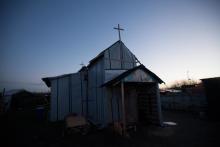
A church and mosque in France’s “jungle” camp for migrants and refugees have been destroyed, despite authorities’ reportedly promising not to demolish the places of worship. Bulldozers moved into the camp in Calais, the departure point for ferries to Great Britain, on Feb. 1 and tore down the mosque, which reportedly drew up to 300 worshippers each day, and St. Michael’s Church, a makeshift chapel serving mainly Orthodox Ethiopian Christians.
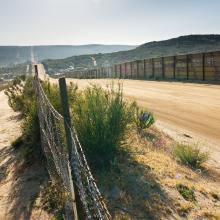
Due to a sudden wave of ICE raids and deportations of asylum seekers fleeing violence in Central America, the White House has faced anger from numerous Democrats in Congress, who drafted a letter denouncing the raids. This new refugee plan, which sets up screening facilities in Central America, aims to reduce human smuggling as well to slow the flow of undocumented immigration.
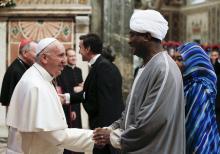
Pope Francis has called on European leaders not to turn their back on refugees and migrants despite the cultural and security challenges associated with the arrival of 1 million people this past year. Francis has made concern for migrants a centerpiece of his papacy, and on Jan. 11 in his annual address to diplomats accredited to the Holy See he again urged governments to “overcome the inevitable fears associated with this massive and formidable phenomenon.”
"I had told her father 'no' many times," Lawrie said in his small suburban-style house in Guiseley, 210 miles (335 kilometers) north of London. "But half past 10 one rainy night, when she fell asleep on my knee as I was leaving for the ferry, I just couldn't leave her there anymore. All rational thought left my head."

The Jungle is an informal camp for refugees in Calais, France. It currently houses nearly 7,000 people who live under tarpaulins and in tents. They are fleeing war-torn areas, economic collapse, and climate change in countries like Syria, Iraq, Afghanistan, Palestine, Sudan, and Ethiopia. There is no drainage in the camp, so when it rains it is a mudbath, there are a few toilets and standpipes.
The journey to The Jungle camp has been dangerous and exhausting for most of them, and new arrivals have often worn out their shoes walking across Europe, some have lost so much weight they need a new size of clothing when they arrive. People arrive traumatized and afraid.

Aside from midnight church services, family reunions, and Ryan Seacrest parties, a significant number of people will celebrate New Year’s Day from the less festive setting of one of the many Syrian refugee camps, in countries like Greece, Turkey, Lebanon, Jordan, or Iraq. These camps symbolize the narrative of the millions of Syrians who have fled their homeland due to the civil war raging since 2011. Their past is filled with political and financial trauma associated with refugee life. Their future is even more threatening as they struggle to reunite with loved ones, deal with the tragic deaths, and readjust to a new life where their Syrian passports may be their single economic asset. Their future is largely unknown. For these survivors, what is so “happy” about 2016?
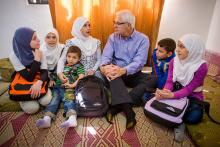
Rejecting fearmongering about the resettlement of Syrian refugees in the U.S., about 100 evangelical leaders are calling on Christians and their churches “to support ministries showing the love of Jesus to the most vulnerable, those in desperate need, and the hurting.”
“Our statement is to change a narrative of fear and instead focus on faith and compassion,” said Ed Stetzer, executive director of LifeWay Research in Nashville, Tenn. “Our desire is not to resettle everybody in another country. When a house is burning down, we need to put out the fire and rescue people fleeing the fire.”

Without mentioning Republican presidential candidate Donald Trump by name, Detroit Archbishop Allen Vigneron has blasted proposals like Trump’s that would specifically bar Muslims from the U.S., saying the idea “fractures the very foundation of morality on which we stand.”
Vigneron’s denunciation, in a letter he sent on Dec. 10 to his priests, is significant because Catholic leaders have been strong defenders of religious freedom in recent years but have been largely quiet in the wake of Trump’s controversial pitch earlier this week to bar all Muslims from the U.S.
“While the Catholic Church refrains from weighing in for or against individual candidates for a particular political office, the Church does and should speak to the morality of this important and far-reaching issue of religious liberty,” Vigneron wrote in the letter, which he also sent to imams in his state.
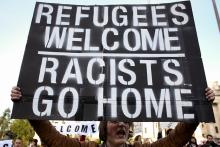
Johnson Ferry Baptist Church, a Southern Baptist megachurch north of Atlanta, has helped resettle a Syrian family, despite an order from Gov. Nathan Deal that the state would not accept Syrian refugees.
Bryant Wright, the church’s pastor and former president of the Southern Baptist Convention, told CNN Dec. 9 he understands the governor is “concerned about the security of the citizens of the state. But as Christians and as a church, we want to reach out with the love of Christ to these folks.”
He told The Atlanta Journal-Constitution that his church had been planning to help the family before the recent attacks in France.

Not since the World War II have United States politicians exercised such an extreme level of xenophobia, nationalism, and unapologetic bent toward fascism. Trump is calling Americans to break faith with our own constitution, which guarantees the protection of all faith traditions within our borders. This is not only un-American: It is ungodly. All humanity, regardless of religious affiliation, is made in the image of God. As such every human being is worthy of respect, dignity, and equal protection of the law. To scapegoat Muslim people is to scapegoat the image of God on earth.
There is a real threat, but it does not come from Islam. It comes from a relatively small band of misguided extremists who are leveraging our fear in order to destroy us — from within.

In a land where Christ himself walked, war is pushing millions of people from their homes. Twelve million Syrians have been forced out in the worst refugee crisis since World War II. They are trekking across oceans and deserts to not just seek a better life, but to try to save their lives from a war that has destroyed their homes and taken away their livelihoods. With little hope of returning home anytime in the near future, they are seeking the safety and protection of foreign lands.
This journey that millions of refugees endure today is not unfamiliar to our Savior, Jesus Christ.
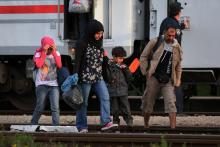
If Donald Trump had been Pharaoh of Egypt, the Holy Family never would have escaped from Herod’s persecution. Jews would have been prohibited from entering the country. Christmas features the story of a family from the Middle East leaving a homeland in fear and seeking refuge is a foreign land, just as millions do today.
If you visit Egypt and its ancient Coptic Church, you’ll see images of the Holy Family everywhere: Joseph, Mary — always on a donkey — and the infant Jesus. They are moving, wandering. You’ll find pictures of them passing by the pyramids. Egyptian Christians treasure this story for theirs is the land that offered welcome and hospitality to the Son of God when he was a refugee.
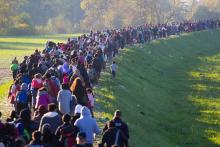
Faith-based agencies that resettle refugees in America stand to gain more than a clear conscience if the United States — after what is expected to be a fierce debate in Congress — accepts a proposed 10,000 Syrian refugees next year.
More refugees also means more revenue for the agencies’ little-known debt collection operations, which bring in upwards of $5 million a year in commissions as resettled refugees repay loans for their travel costs. All nine resettlement agencies charge the same going rate as private-sector debt collectors: 25 percent of all they recoup for the government.
This debt collection practice is coming under increased scrutiny as agencies occupy a growing stage in the public square, where they argue America has a moral obligation to resettle thousands of at-risk Syrian refugees. Some observers say the call to moral action rings hollow when these agencies stand to benefit financially.

Hate crimes in America dipped across the board in 2014, except in the category of anti-Muslim crimes, which rose about 14 percent over the prior year. Given the barbaric Islamic State attacks in Paris last week and elsewhere recently, that latter trend seems destined to accelerate.
The presence of hate crimes against Muslims is no new phenomenon. Prior to the 9/11 attacks, there typically recorded between 20-30 hate crime against Muslims per year and after 2001 that number rose to nearly 500.
This summer, we saw the murder of three Muslim students in Chapel Hill, N.C. On Nov. 15 in London, a man pushed a Muslim woman into an oncoming underground train. And on Thanksgiving Day, a man in a taxicab in Pittsburgh, Pa., shot his driver in the back for being Muslim.
These incidents do not need to be listed as statistics to validate reality but they do need to be heard.

There are many reasons to recommend Brooklyn — its relatable story for one, its glowing visuals and performances for another. But Brooklyn’s commendable qualities go far beyond this, including the amount of respect writer Nick Hornby and director John Crowley give the movie’s female protagonist. Brooklyn is a movie about hard choices, and for the most part, Eilis makes those choices on her own. At different points in the film, she’s caught between romantic relationships, and familial and personal obligations. But in none of these situations does it feel like her hand is forced. The movie lets us know early that Eilis can take care of herself, and she’s never forced to compromise on that point, though she easily could have been.
Although politics aren’t really on Brooklyn’s agenda, the film also carries an unintentional point on that score worth considering. At a time when the United States is anxious about welcoming refugees and immigrants, this film reminds us that our country is made up largely of immigrants — some who look like Eilis, but also many who don’t.
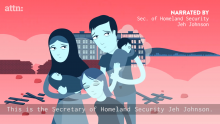
“Taking in refugees at a time of crisis is simply the right thing to do.”
These words from Jeh Johnson, the United States Secretary of Homeland Security, are spoken in a recent video released by the new-media news source ATTN: on Nov. 24. Through simple, yet powerful, illustrations, the video debunks the myths of refugee resettlement in the United States, with specific attention to the Syrian refugee crisis.

God’s been telling the story of restoration since Genesis when we were created selem Elohim, in the image of God. We were created into perfect communion with God. From Genesis 3 until the end of the Old Testament, we see a narrative of a people in exile and God giving opportunities for reconciliation and restoration of relationship that humanity is incapable of accepting. Reconciliation is an exchange of something worthless (our condition of sin) for something immeasurably worthy (communion with God).
In the New Testament we see a biblical narrative through Jesus of now-but-not-yet restoration. In Jesus we see the coming of the Kingdom of God and get to be reconciled back to God. We even get a glimpse of an eternity where there is no more death or mourning or crying or pain.
If we truly believe we are the image of God, it changes how we approach the image of God in the world. Our call then is to actively partner with God in taking the world somewhere.

The GOP leadership really doesn’t want refugees to come to the United States. And Stephen Colbert has a few things to say about that.
Republican leaders in Congress approved a bill Nov. 19 requiring “our nation’s top security officials” to certify that each refugee poses no threat, despite the United States’ already stringent immigration guidelines. Under the guise of “security,” the bill practically functions to severely restrict the number of Syrian refugees able to enter the United States.